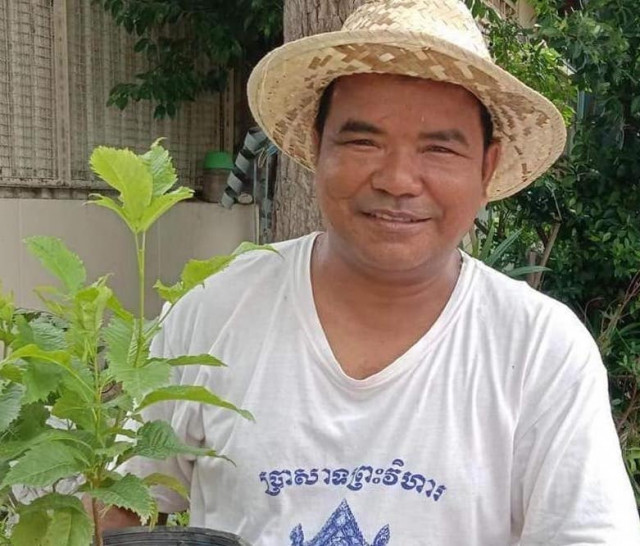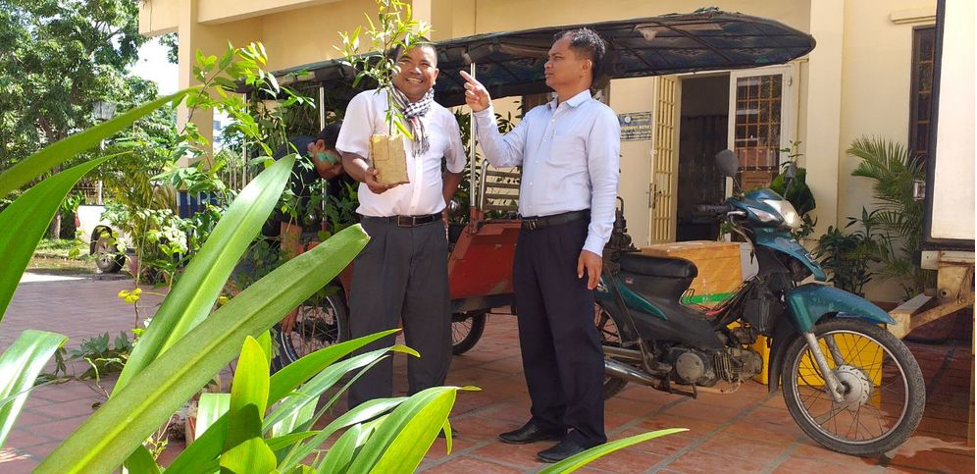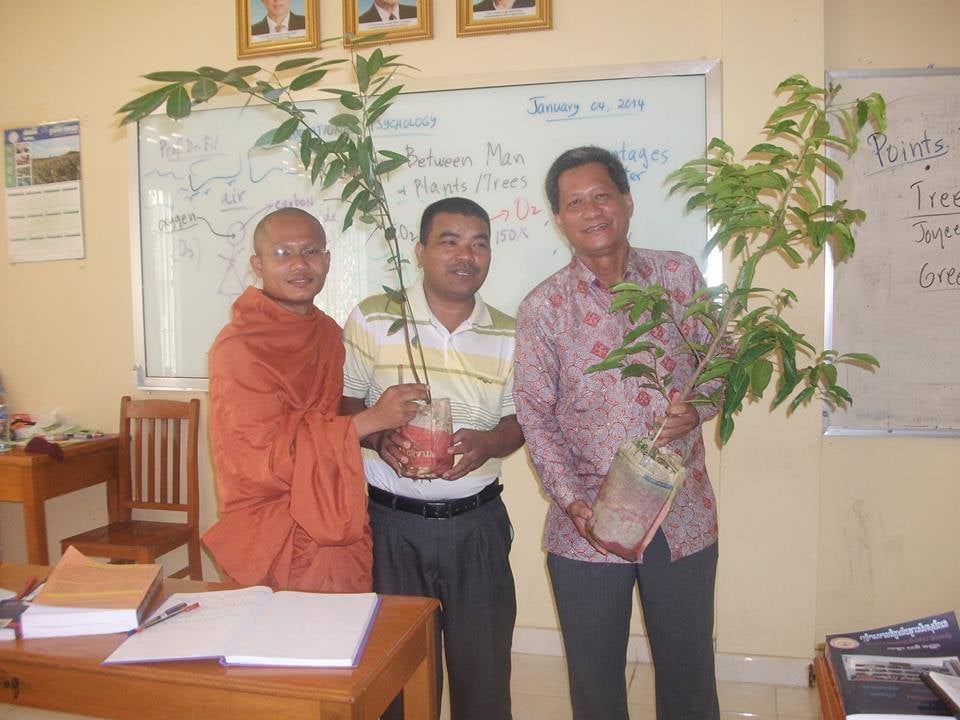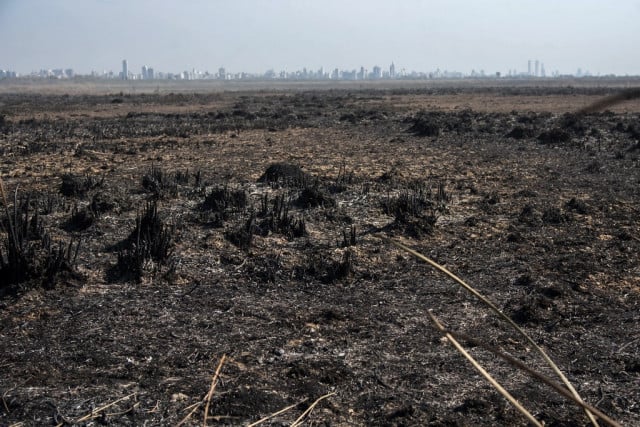Nao Sok: an Earth Doctor of Cambodia

- By Lay Lon
- May 1, 2022 8:33 AM
His passion for trees and nature has inspired scores of people over decades
“When I see that the trees I planted or donated provide benefits to people, it makes me so happy: I want to do more,” said Nao Sok who has spent most of his life planting trees.
Sok has planted and distributed more than 80,000 trees across Cambodia over the last two decades. Which has prompted the environmental-protection enterprise Maitri Artha Shastra Ltd to name him Earth Doctor in Cambodia.
Modest, humble and filled with national pride, Sok is optimistic about what is happening in the country. And there is no question that he will continue what has become his mission: bringing saplings and seeds wherever he goes.
Born in 1970 in Samraong District in Takeo Province, Sok currently lives in Phnom Penh.
Like many children in rural Cambodia at the time, he spent part of his childhood taking care of cattle, growing up in natural settings.
“Swimming in the stream, collecting firewood in the forest, harvesting wildflowers and fruits in nature are some of the activities that had great impact on me,” Sok said in 2013 during a workshop in Siem Reap Province.
A prolific reader, Sok has been inspired by books on the Buddha’s life associated with nature. He loves works of literature about nature, especially about the Himalayan forests and stories written in the 18th and 19th centuries that speak of how green the forests were in Cambodia.
“In the stories mostly written in poetry form,” he said, “writers usually mention the beauty of nature so vividly that, sometimes, I have to re-read the line several times before reading more.”

Sok worked at Church World Service (CWS), an international non-profit organization, from 1995 to 2018 as a community development worker. During his early years at CWS, he started realizing how vital plants are for humans. He observed that nature in Cambodia had changed, affecting people’s livelihoods.
“One of the topics in the training…that CWS sent me to attend [was] the impact of deforestation,” Sok said. The program provided him with the opportunity to see how to be a part of the solution, he said.
“The picture of hungry vultures waiting to eat the very skinny people at the peak of a famine in a country in Africa,” he said, stayed with him. “The long civil war and deforestation pushed me to take action to counter deforestation in Cambodia.”
Sok has been planting trees at his own expense since 1998. His actions have inspired his relatives, friends, and the public with many among them now sponsoring his work.
According to his nephew Neang Dara, Sok wants Cambodia to be full of trees that provide flowers, fruits and shelter. This 43-year-old nephew is very proud of his uncle and supports his activities. “I usually donate some money to him, but I have had no chance to join him in person because I do not live in Cambodia,” Dara said.
Enrolling everyone he meets into tree planting and respect for nature
Sok could not do his work without the support of friends and institutions, he said. Buddhist monks and Sok ran a sapling nursery at the Botumvatey monastery from 2004 to 2016 to seed sal trees, also known as couroupita guianensis. The nursery ended up producing 2,000 saplings.
Sok is also a plant seed collector, bringing seeds to some private nurseries that are not far from his home in Takhmao City in Kandal Province.
Sok has planted and distributed three kinds of flora: flower, fruit, and timber vegetations. “When I travel to provinces whether for work or personal reasons, I carry trees with me most of the time,” he said. “Sometimes, I give them to people I meet on the way.”
Having four children, Sok considers their birthdays perfect occasions to give trees.
In early 2021, he donated 45 saplings of 12 types of flowering trees to the Royal Academy of Cambodia (RAC) in Phnom Penh.
Then in August 2021, he gave the academy six types of rare species, 29 saplings in total. “As secretary-general of the RAC, I thanked Sok for his sapling donations to promote the environment at RAC," said Yang Peou, secretary-general of the Royal Academy. “And we also welcome all donors who aim to support the institution.”
In addition to donating saplings, Sok sometimes transports trees to the provinces and takes part in tree planting events usually on national holidays.
Sok’s action has inspired his friends and university students to get involved in tree planting, leading them to set up tree nurseries.
When asked how he feels when his tree-planting mission leads to results in society, Sok smiled and mentioned a visit to Preah Vihear Province in 2009 where he had gone to train a community’s people.
“I stayed in a monastery during that time” he recalled. “After my work session, villagers brought me to visit the nearby forest where I was able to collect some seeds of flea trees (or albizia lebbeck).
“When I returned home, I sowed those seeds and contributed six saplings to the Buddhist Meditation Center of the Kingdom of Cambodia in Kandal Province, about 40 kilometers from the capital city,” Sok said. “A few years later, I revisited the center, and a monk pointed at the growing flea trees whose seed I had brought in.
“I was excited about how well they had grown,” he said. “I knew that the clergymen had collected those seeds to produce about 8,000 saplings in the last four years. I also knew that cooks had picked those shoots and cooked them for people who come to learn meditation.”
A dedication based on religious beliefs, a love for living things and science
Sok graduated with a Bachelor of Art in International Relations from Pannasastra University of Cambodia in 2009, where he met Penh Vibol who was one of his classmates.
Vibol is a Cambodian Buddhist monk residing at the Botumvatey Monastery in Phnom Penh who teaches at the Preah Sihanouk Raja Buddhist University and at Pannasastra University.
“[Sok] is a positive and [a] proactive person, and this enables him to associate with others,” Vibol said. “He has dedicated himself to protecting, contributing and the planting [of trees].”
Vibol has received hundreds of flowering and timbering saplings from Sok. He selected and planted ashoka saplings at the temple where he resides. “Now [ashoka trees] grow and provide shading for…up to 100 people, and they can sit under the ashoka trees until today,” he said.
Vibol also took timbering trees to his homeland in Kampong Chhnang Province. “These trees are growing very well in my hometown because kranhung—dalbergia cochinchinensis pierre—and beng—afzelia xylocarpa—grow well on the mountain,” he said.
Sok continued his studies and obtained a Master of Art in Applied Conflict Transformation studies in 2012 at the same university, developing friendships with several professors in the process.
Fil B. Tabayoyong, Jr., who was one of Sok’s professors, has lived in Cambodia for nearly two decades. “I learned that he was engaged in tree planting,” he said. “He loved to discuss with me the issues regarding the subject that he learned from me…he would always interject his project of tree planting.”

According to him, Sok did not only plant but also explained to him—a foreign professor—why Rumdoul trees, which produce the national flower of Cambodia, should be sowed. Sok had donated and helped Fil purchase sapling. “I was so happy I planted Rumdoul (Mitrella mesnyi),” he said. “It has grown so big and healthy with flowers, you know, and it made me very happy."
According to Fil, climate change is serious, but the biggest problem is selfish people. Some individuals destroy forests for their personal benefit without considering how eliminating forests affects the whole society, he said. This is why Fil said he appreciates what Sok has been doing in Cambodia, inspiring many people to love and preserve the environment.
“Now this is a strong passion,” Fil said. “Each time I meet him, we still talk about tree planting.”
This passion, he said, “should be passed on from generation to generation…because if we lose trees, we lose lives.”
Lay Lon is an undergraduate student in the Department of English, at the US University of Massachusetts--Lowell















